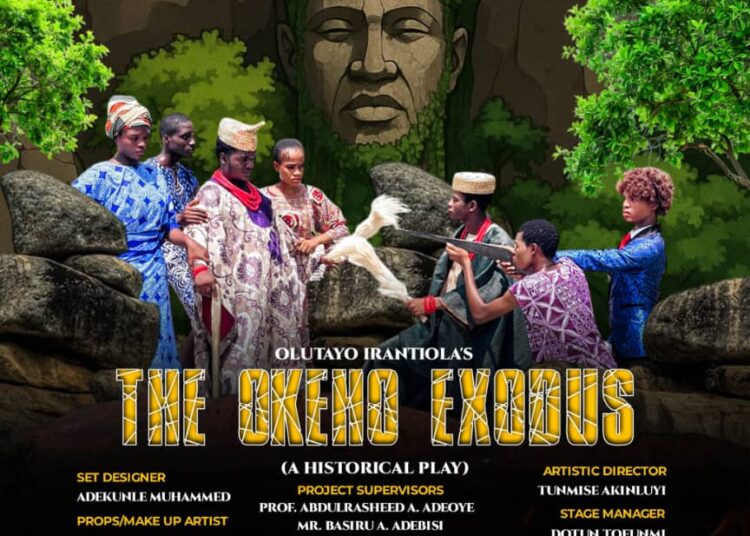The Department of Performing Arts and Film Studies at Kwara State University (KWASU), Malete, is proud to announce the season of the festival of plays which will run from June 23- July 4, 2025.
The graduating class’s Group 2 will bring to life the historical play The Okeho Exodus by Olutayo Irantiola through a sterling performance. This historical play will be performed on Thursday, June 26, 2025, at 2:00 PM, at the state-of-the-art Performing Arts Ultra-Modern Theatre, Kwara State University, Malete
The Okeho Exodus, a historical play written by renowned Nigerian playwright Olutayo Irantiola, delves into the dramatic events of 1912- 1916 that led to the forced relocation of the town of Okeho by the colonialists. The play released in October 2022 recounts the tumultuous period in 1916 when the people of Okeho were forced to relocate from their ancestral settlement in the hills (Okeho Ahoro) to their original site (Okeho Ile) under British colonial administration.
It vividly portrays the internal divisions among local chiefs, the impact of colonial laws and taxation and the ultimate uprising against the colonial authority, which led to significant changes in the town’s governance and identity. The play serves as a poignant reminder of colonialism’s complexities and the Nigerian communities’ enduring spirit in the face of adversity.
The play vividly explores themes of betrayal, resistance, colonial interference and the enduring spirit of a community facing immense upheaval. This stage adaptation, directed by Akinluyi Tunmise, promises to be a powerful theatrical experience that will offer audiences a vivid portrayal of a pivotal moment in Nigerian history.
Speaking about the upcoming performance, the project supervisor, Professor Abdulrasheed A. Adeoye remarked, “We are incredibly excited to share The Okeho Exodus with the public. This production is the culmination of immense hard work and dedication from our talented students. It’s more than just a play; it’s an educational and cultural endeavour that brings history alive. We believe it will be a truly moving experience for everyone who attends, sparking conversations about our past and its resonance with the present.”
Also commenting on the production, Olutayo Irantiola, Playwright of The Okeho Exodus stated, “It is truly fulfilling to see my work interpreted and brought to life by the next generation of Nigerian performing artists. The story of Okeho is one of resilience and the profound impact of historical shifts, and I am eager to see how these talented students convey its essence to the audience.”
This captivating stage production by Group 2 of the graduating class promises to transport audiences to the heart of Okeho’s rich history. Witness the epic story of courage, conflict, and community come alive on stage, as the vibrant cultural heritage and dramatic events of Okeho unfold live through the artistry and passion of Kwara State University’s emerging performing artists.
Other plays going on stage include Kiriji by Wale Ogunyemi; Aadoye by Steve James; Mammy Water’s Wedding by Bode Sowande; Oluronbi by Babatunde Ojobaro; Lisabi by E.O. Owolabi; Iyalode Efunsetan by Felix Akinsipe; The Devil’s Song by Ade Adeniji; Ijaye by Wale Ogunyemi; The Legendary Thief by Modupe A Jolayemi and Rogbodiyan by Bakare Ojo Rasaki.
-ENDS-
About the Department of Performing Arts and Film Studies, Kwara State University
The Department of Performing Arts and Film Studies at Kwara State University is dedicated to nurturing the next generation of creative professionals in theatre, film and other performing arts. Through rigorous academic training, practical workshops and hands-on experience, students develop the skills and knowledge necessary to excel in the dynamic and evolving entertainment industry. The department is committed to producing graduates who are not only technically proficient but also creatively innovative and culturally aware.
About “The Okeho Exodus”
“The Okeho Exodus” is a historical play written by Olutayo Irantiola and originally released in October 2022. The play recounts the tumultuous period in 1916 when the people of Okeho were forced to relocate from their ancestral settlement in the hills (Okeho Ahoro) to a new site (Okeho Ile) under British colonial administration. It vividly portrays the internal divisions among local chiefs, the impact of colonial laws and taxation and the ultimate uprising against the colonial authority, which led to significant changes in the town’s governance and identity. The play serves as a poignant reminder of the complexities of colonialism and the enduring spirit of Nigerian communities in the face of adversity.













